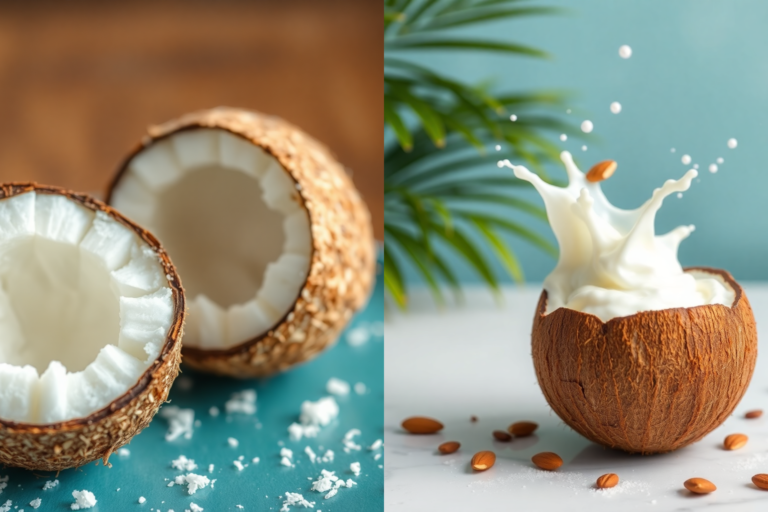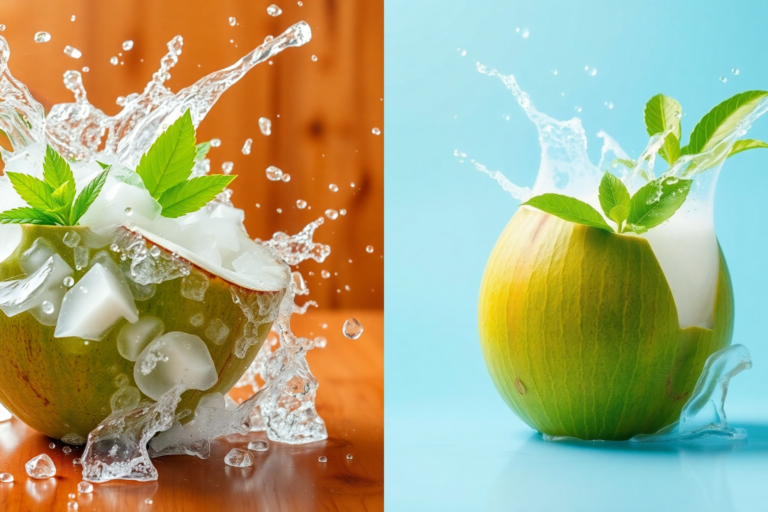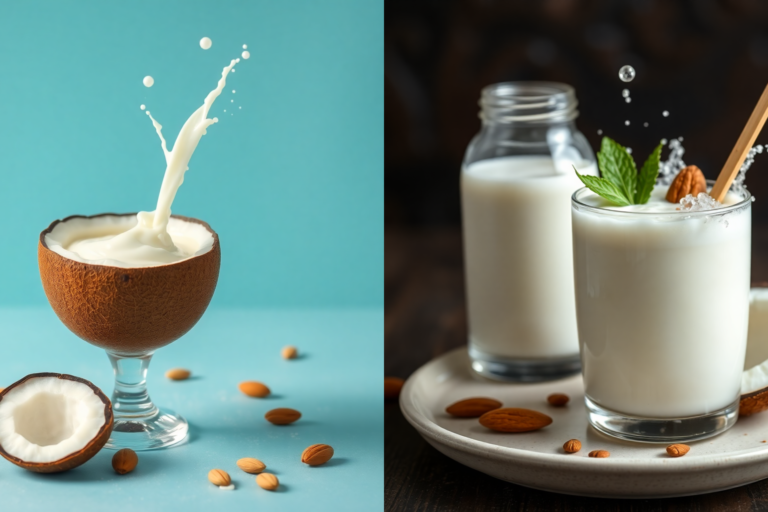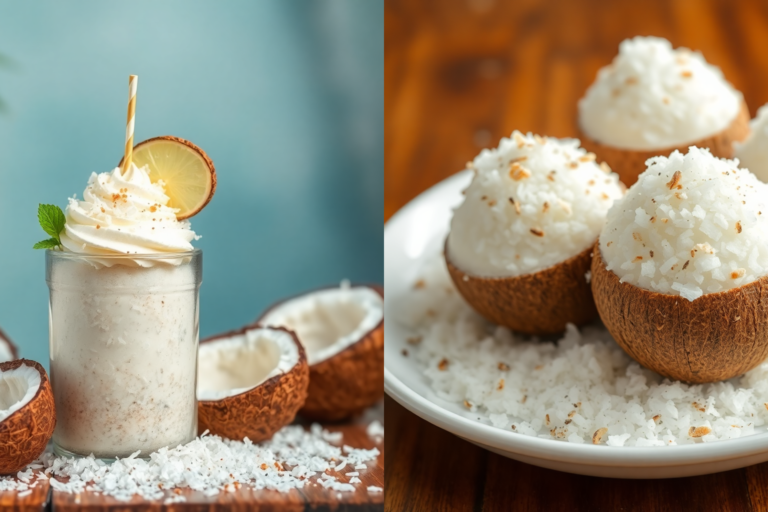Coconut Butter vs Coconut Oil: Understanding the Differences for Skin and Hair Care
Introduction: Coconut Butter vs Coconut Oil in Skin and Hair Care
Coconut butter and coconut oil are both derived from the coconut, but they have distinct properties that make them unique in their applications, especially in skin and hair care. Understanding the differences between Coconut Butter vs Coconut Oil is crucial to selecting the right product for your beauty routine. Both have moisturizing, nourishing, and soothing qualities, but their composition and benefits vary, offering different textures and results for various skincare needs.
Coconut butter is made by blending the meat of the coconut with the natural oils found within. It has a thick, creamy texture that solidifies at cooler temperatures, making it ideal for deep hydration and skin barrier protection. On the other hand, Coconut Oil is extracted from the flesh of the coconut and is lighter and more fluid in consistency. It absorbs quickly into the skin and can be used for a wide range of beauty applications.
Coconut Butter vs Coconut Oil: Composition and Benefits
When comparing Coconut Butter vs Coconut Oil, one of the key differences lies in their composition. Coconut Oil is primarily made up of medium-chain fatty acids (MCFAs) that provide excellent hydration, anti-inflammatory, and antimicrobial benefits. It penetrates deeply into the skin, making it an effective moisturizer and a natural treatment for dryness or irritation. Its light texture makes it a favorite for hair care, where it helps to reduce frizz, promote shine, and repair damaged strands.
Coconut Butter, on the other hand, retains a higher content of the whole coconut flesh, which gives it a more solid texture. It is rich in fatty acids, vitamins, and antioxidants, making it ideal for deep skin hydration, especially for dry, cracked, or sensitive skin. The thicker consistency of coconut butter makes it perfect for creating balms or lotions that provide a longer-lasting moisture barrier. For the hair, Coconut Butter can be used as a deep conditioning treatment to restore moisture to brittle hair.
Coconut Butter vs Coconut Oil for Skin Care
When considering Coconut Butter vs Coconut Oil for skincare, both products offer unique benefits depending on your skin type and needs. Coconut oil is often preferred for general daily moisturizing because it’s lightweight, absorbs easily, and is highly effective at treating dry skin, especially in warmer climates. It is also known to have natural antibacterial properties, which make it a popular choice for treating acne or soothing minor skin irritations.
In contrast, Coconut Butter is better suited for those with very dry or sensitive skin. Its thicker, more emollient texture allows it to create a barrier that locks in moisture, making it an excellent choice for tackling rough, patchy areas such as elbows, knees, or feet. It’s also ideal for treating conditions like eczema or dermatitis, where additional moisture is needed to keep skin calm and nourished.
Coconut Butter vs Coconut Oil for Hair Care
In hair care, Coconut Oil is renowned for its ability to penetrate the hair shaft, providing deep hydration and repairing damage. It works wonders as a pre-shampoo treatment, helping to reduce protein loss and prevent split ends. It’s also great for smoothing frizz and adding shine to your locks. For those with fine or oily hair, Coconut Oil offers the perfect lightweight moisture without weighing hair down.
However, if you have dry or curly hair in need of extra nourishment, Coconut Butter can be a game-changer. Its thicker consistency helps to coat the hair, offering deep conditioning and smoothing effects. It is especially beneficial as a leave-in conditioner for dry ends or as an overnight hair mask to restore moisture and softness.
What Is Coconut Butter? Understanding the Differences: Coconut Butter vs Coconut Oil
Coconut butter is a natural product derived from the flesh of the coconut fruit. Unlike coconut oil, which is extracted from the oil-rich parts of the coconut, coconut butter vs coconut oil refers to two distinct products that have different uses, textures, and compositions. While both are derived from coconuts, coconut butter retains the coconut meat, giving it a creamy texture and rich flavor. This makes it not just a healthy fat but also a source of dietary fiber.
Coconut Butter Composition: How It Differs from Coconut Oil
Coconut butter is made by blending dried coconut flesh (desiccated coconut) until it forms a smooth, creamy paste. This process preserves all the nutritional elements of the coconut meat, such as its natural oils, fibers, and proteins. In contrast, coconut butter vs coconut oil primarily highlights the absence of coconut meat in coconut oil, which is purely composed of the oil extracted from the coconut.
Key ingredients in coconut butter include:
- Coconut meat: Provides fiber, vitamins, and minerals.
- Coconut oil: Contributes healthy fats such as medium-chain triglycerides (MCTs) and lauric acid, known for their benefits to heart health and metabolism.
Coconut butter, with its rich and creamy consistency, is commonly used in both cooking and beauty routines. It has a higher fiber content than coconut oil because it includes the coconut meat in its composition.
How Coconut Butter Is Made: A Simple Process
Making coconut butter is a relatively simple process:
- Harvesting the Coconut: The fresh coconut is cracked open to extract the white flesh.
- Drying the Flesh: The flesh is dehydrated until it is desiccated, ensuring that it’s free of moisture.
- Blending into a Smooth Paste: The desiccated coconut is then blended until it forms a creamy, thick paste. The natural oils in the coconut flesh bind with the fibrous part, creating a luscious spread.
Unlike coconut oil, which requires a process of cold-pressing or centrifuging to separate the oil from the coconut meat, coconut butter retains the full flesh of the coconut, giving it a more substantial, paste-like consistency. This is what makes coconut butter unique compared to coconut oil’s liquid state at room temperature.
Key Benefits of Coconut Butter for Skin and Hair
Coconut Butter vs Coconut Oil often comes up when discussing beauty benefits, as both products are widely used for skincare and hair care. However, coconut butter offers distinct advantages due to its higher fiber content and inclusion of coconut meat.
Skin Benefits:
- Moisturizing: Coconut butter is an excellent moisturizer for dry skin. Its thick consistency helps lock in moisture, making it perfect for those with rough or dry patches.
- Healing Properties: Due to its anti-inflammatory properties, coconut butter can soothe irritated skin and help with minor burns or cuts.
- Anti-Aging: The antioxidants in coconut butter protect the skin from free radicals, potentially reducing the appearance of wrinkles and fine lines.
Hair Benefits:
- Nourishment for Dry Hair: Just like coconut butter vs coconut oil, coconut butter can help nourish dry, brittle hair. The fatty acids provide moisture and shine, reducing frizz and promoting healthy, soft hair.
- Scalp Treatment: Coconut butter can be massaged into the scalp to relieve dryness and dandruff. Its hydrating properties can help balance the scalp’s oil production, which is vital for healthy hair growth.
Coconut Butter vs Coconut Oil: Which One to Use?
When it comes to beauty treatments, both coconut butter and coconut oil have their place, but they serve different purposes. Coconut butter vs coconut oil in skincare and hair care depends on your needs:
- Coconut Butter: Ideal for those seeking a thicker, richer texture with additional fiber for deep moisture.
- Coconut Oil: Best for lighter, oil-based treatments, such as hair masks or a simple body oil for smooth, hydrated skin.
What Is Coconut Oil? Understanding Its Composition and Benefits: Coconut Butter vs Coconut Oil
Coconut oil is a natural oil extracted from the meat or flesh of mature coconuts. It is highly versatile and used in various industries, ranging from cooking to skincare and hair care. Coconut oil has a unique composition of fats, primarily saturated fats, which makes it a solid at room temperature but meltable when heated. It is also rich in medium-chain triglycerides (MCTs), which are known for their potential health benefits.
The Composition of Coconut Oil: Coconut Butter vs Coconut Oil
Coconut oil is primarily composed of fatty acids, including:
- Lauric acid (about 50% of its content): This is a medium-chain fatty acid known for its antimicrobial and anti-inflammatory properties.
- Caprylic acid and Capric acid: These are other MCTs that are thought to support digestive health and have antifungal properties.
- Oleic acid: A monounsaturated fatty acid that is found in other oils like olive oil and offers antioxidant benefits.
Coconut oil also contains vitamins E and K, and its rich composition contributes to both its health benefits and versatility in different applications.
Types of Coconut Oil: Coconut Butter vs Coconut Oil
There are several types of coconut oil, each with different processing methods, which affect their taste, smell, and uses:
- Virgin Coconut Oil (VCO): This is the purest form of coconut oil, made from fresh coconut meat and processed without any chemicals. It retains a mild coconut flavor and aroma, making it ideal for cooking and beauty applications. Virgin coconut oil is also known for its higher content of antioxidants and nutrients compared to refined oil.
- Refined Coconut Oil: Refined coconut oil is made from dried coconut meat (copra) and undergoes a refining process that removes impurities, odors, and flavors. It has a higher smoke point, making it a better option for high-heat cooking, but it contains fewer nutrients than virgin coconut oil.
- Cold-Pressed Coconut Oil: This oil is extracted through a cold-pressing process, maintaining much of the oil’s natural flavor, nutrients, and antioxidants. It is commonly used in cooking and cosmetic products.
Both virgin and refined coconut oil are commonly used in skincare and hair care, but Coconut Butter vs Coconut Oil differs in texture and consistency. Coconut butter is made from the whole coconut flesh, including both the oil and the coconut meat, while coconut oil is just the extracted fat.
Key Benefits of Coconut Oil for Skin and Hair: Coconut Butter vs Coconut Oil
Benefits for Skin: Coconut Butter vs Coconut Oil
Coconut oil is well-known for its moisturizing and nourishing properties, making it an excellent ingredient in skincare routines. Some of the benefits include:
- Deep Moisturization: Coconut oil penetrates deep into the skin, providing hydration without leaving a greasy residue. It’s especially effective for dry skin and rough patches.
- Anti-inflammatory Properties: The lauric acid in coconut oil helps reduce inflammation, which is beneficial for conditions like eczema and psoriasis.
- Antioxidant Effects: The presence of vitamin E in coconut oil provides protection against free radical damage, helping to slow down the signs of aging.
- Skin Protection: Coconut oil acts as a natural barrier, shielding the skin from environmental pollutants and UV damage.
While Coconut Butter vs Coconut Oil can both be used for skincare, coconut butter is richer in texture due to its inclusion of coconut meat, providing a thicker layer of protection, ideal for very dry or cracked skin.
Benefits for Hair: Coconut Butter vs Coconut Oil
Coconut oil is a popular ingredient in hair care because of its ability to deeply condition and restore shine. Here are some of the benefits:
- Promotes Hair Growth: The lauric acid in coconut oil has been shown to help with hair growth by improving blood circulation to the scalp.
- Reduces Protein Loss: Coconut oil helps prevent protein loss in hair, keeping it strong and healthy. It can be used as a leave-in conditioner or overnight hair mask.
- Detangles Hair: Coconut oil is excellent for detangling and smoothing hair, especially for those with curly or frizzy hair.
- Prevents Dandruff: The antifungal properties of coconut oil make it effective in treating dandruff and dry scalp conditions.
When comparing Coconut Butter vs Coconut Oil, coconut butter provides additional benefits as it retains some of the coconut’s natural fibers, which can enhance its ability to lock in moisture and smooth the hair.
Coconut Butter vs Coconut Oil: Key Differences
When it comes to natural skincare and haircare, coconut butter and coconut oil are two popular options that offer unique benefits. Both come from the coconut, but they differ in their texture, consistency, absorption rate, and overall effectiveness for different skin and hair types. Let’s dive into the key differences between Coconut Butter vs Coconut Oil in terms of texture, absorption, and nutritional content, and how each affects skin and hair health.
Coconut Butter vs Coconut Oil: Texture and Consistency
The primary difference between Coconut Butter vs Coconut Oil is their texture and consistency. Coconut Oil is a liquid at warmer temperatures and solidifies when cooled below 76°F (24°C). It has a smooth, oily consistency that is ideal for quick absorption, making it suitable for massaging into the skin or applying to hair.
On the other hand, Coconut Butter has a much thicker, creamier consistency due to its inclusion of the whole coconut flesh. It contains both coconut oil and coconut solids, which give it a firmer texture. It is more solid at room temperature than Coconut Oil but will soften when warmed. This makes Coconut Butter more ideal for moisturizing dry areas like elbows, knees, and heels, or for use as a rich, creamy base in skincare products.
Coconut Butter vs Coconut Oil: Absorption Rate and Effectiveness for Skin and Hair
When it comes to Coconut Butter vs Coconut Oil, absorption rate plays a significant role in their effectiveness. Coconut Oil tends to be absorbed quickly into the skin and hair, making it ideal for deep hydration and nourishment without leaving a greasy residue. It is particularly beneficial for individuals with oily skin or those looking for a lighter texture in their skincare routine.
Coconut Butter, however, takes slightly longer to absorb due to its thicker, more substantial texture. This slower absorption makes it perfect for individuals with dry skin or those needing intense moisture. It works wonders on dry, cracked skin or hair in need of a deeper conditioning treatment. For hair, Coconut Butter provides long-lasting hydration and helps lock in moisture, making it an excellent option for people with very dry or coarse hair.
Coconut Butter vs Coconut Oil: Nutritional Content and How It Impacts Skin and Hair Health
Both Coconut Butter vs Coconut Oil offer unique nutritional benefits, especially for the skin and hair. Coconut Oil is rich in medium-chain fatty acids (MCFAs), particularly lauric acid, which has antibacterial, antifungal, and moisturizing properties. These nutrients help protect and hydrate the skin, improving its overall appearance and preventing dryness. In haircare, Coconut Oil penetrates the hair shaft easily, reducing protein loss and preventing damage from heat and environmental factors.
Coconut Butter, being made from both coconut oil and the flesh of the coconut, has a richer profile of antioxidants and fatty acids, making it an excellent moisturizer. The additional coconut solids give it an extra boost in providing vitamins and minerals like vitamin E and beneficial fats, which contribute to soft, smooth skin and hair. When applied to the skin, Coconut Butter offers not just hydration but a luxurious, nourishing treatment that can soothe irritation and calm inflammation.
In terms of hair health, Coconut Butter works wonderfully as a deep conditioner, leaving hair feeling softer, shinier, and more manageable. It’s particularly beneficial for dry, damaged hair that needs intense hydration and repair. Coconut Oil, while also great for hair health, is typically used more frequently in smaller amounts as a pre-wash treatment or a leave-in conditioner.
Coconut Butter vs Coconut Oil: Which One is Best for Your Skin and Hair?
Coconut butter and coconut oil both offer incredible benefits for skin and hair, but understanding their differences can help you decide which one is best for your needs. While both are derived from coconuts, they have distinct properties that make them unique in skincare and haircare routines.
Moisturizing and Nourishing Properties of Coconut Butter vs Coconut Oil
Coconut Butter vs Coconut Oil: The Ultimate Skin Moisturizer
Coconut butter is rich in fatty acids, antioxidants, and vitamins that nourish and hydrate the skin deeply. Its creamy consistency provides a thick, emollient texture that forms a protective barrier, locking moisture in and keeping the skin hydrated for longer periods. When it comes to Coconut Butter vs Coconut Oil, coconut butter is more effective at treating dry and flaky skin, thanks to its higher content of solidified coconut flesh. The addition of coconut meat in coconut butter enhances its moisturizing benefits, offering a more intense hydration experience compared to coconut oil, which is thinner in consistency.
Coconut Butter’s Effect on Sensitive Skin Types
If you have sensitive skin, Coconut Butter vs Coconut Oil might be a dilemma. However, coconut butter’s higher concentration of coconut solids offers a gentler touch on sensitive skin. Its rich, creamy texture helps to soothe and calm irritated skin, making it an excellent choice for those with conditions like eczema, psoriasis, or rosacea. Coconut oil, on the other hand, can sometimes be too light or have a more intense penetration, which might irritate more delicate skin types. Therefore, Coconut Butter vs Coconut Oil boils down to preference and specific skin needs.
Best Uses for Dry Skin and Hair with Coconut Butter vs Coconut Oil
Dry Skin Relief: Coconut Butter vs Coconut Oil
For those suffering from dry, rough patches of skin, coconut butter offers superior benefits. The creamy consistency of coconut butter allows for longer-lasting hydration, making it ideal for use on areas like elbows, knees, and heels, where skin tends to be more cracked and dry. When applied to the skin, it deeply nourishes, providing long-term moisture, especially in colder weather when skin tends to lose moisture more easily. Coconut Butter vs Coconut Oil – while both are good for dry skin – coconut butter’s thicker texture makes it a preferred choice for intense dryness.
Hair Care: Coconut Butter vs Coconut Oil for Nourishing and Repairing
Both coconut butter and coconut oil are great for improving hair health, but the choice of which to use largely depends on your hair type. For dry and damaged hair, Coconut Butter vs Coconut Oil both offer nourishing benefits, but coconut butter’s heavier texture provides added moisture and a protective layer for hair that needs intense hydration. Its thicker consistency is great for sealing in moisture, leaving your hair shiny, soft, and smooth. On the other hand, coconut oil can be lighter and more easily absorbed into the scalp and hair shaft, making it a better choice for regular use or those with finer hair.
Coconut Butter for Hair Masks and Treatments
One of the best ways to use coconut butter is in a DIY hair mask. Coconut Butter vs Coconut Oil can be used for deep conditioning treatments, but coconut butter’s richer texture can create a more luxurious, thick mask for severely dry or damaged hair. When combined with other natural ingredients, such as honey or avocado, coconut butter helps rejuvenate the scalp and hair, restoring moisture and shine.
Coconut Butter vs Coconut Oil: The Final Verdict for Your Skin and Hair
Ultimately, both Coconut Butter vs Coconut Oil provide powerful benefits for your skin and hair. If you’re looking for deep hydration and a soothing effect on sensitive skin, coconut butter may be the best option for you. However, if you prefer a lighter oil that penetrates the skin or hair quickly, coconut oil might be a better fit. Consider experimenting with both to see which one suits your skin and hair needs most effectively.
Coconut Butter vs Coconut Oil: Benefits for Skin and Hair
Understanding Coconut Butter vs Coconut Oil
When it comes to natural beauty and skincare, both coconut butter and coconut oil have gained immense popularity. While they share similar origins, their composition and benefits differ significantly. Coconut oil is extracted from the coconut meat and is widely used for its deep moisturizing properties. In contrast, coconut butter is made from the whole coconut flesh, retaining more fiber and nutrients. Understanding the differences between Coconut Butter vs Coconut Oil can help you choose the best option for your skin and hair care routine.
Coconut Butter vs Coconut Oil: Deep Conditioning and Repairing Properties
One of the key advantages of Coconut Butter vs Coconut Oil is their ability to deeply nourish and repair both skin and hair. Coconut oil penetrates the hair shaft, providing intense hydration and helping to restore damaged strands. It also forms a protective layer on the skin, locking in moisture and preventing dryness. Coconut butter, on the other hand, contains more natural fats, making it an excellent choice for soothing dry patches, chapped skin, and even eczema. Whether you’re looking to revive dry hair or deeply condition your skin, knowing the benefits of Coconut Butter vs Coconut Oil can help you make the right choice.
Coconut Butter vs Coconut Oil: Anti-Aging Effects for the Skin
The anti-aging properties of Coconut Butter vs Coconut Oil make them highly effective in maintaining youthful skin. Coconut oil is rich in antioxidants like vitamin E, which helps fight free radicals and reduce signs of aging, such as fine lines and wrinkles. It also improves skin elasticity, giving a firmer and more youthful appearance. Coconut butter provides additional nourishment, thanks to its fiber content, making it a great natural remedy for reducing inflammation and enhancing skin texture. Incorporating both Coconut Butter vs Coconut Oil into your skincare routine can promote a healthy, radiant glow while protecting against premature aging.
Coconut Butter vs Coconut Oil: Popular Uses for Hair Care
The debate between Coconut Butter vs Coconut Oil extends to hair care, where both products offer incredible benefits. Coconut oil is widely used as a scalp treatment, helping to combat dandruff and dryness while promoting healthy hair growth. It also works as an excellent frizz control solution, keeping hair smooth and manageable. Coconut butter, being thicker, is ideal for deep-conditioning hair masks, especially for individuals with curly or coarse hair. If you’re wondering whether to choose Coconut Butter vs Coconut Oil for your hair, consider your specific needs—coconut oil is lightweight and penetrates easily, while coconut butter provides extra moisture for intense hydration.
Coconut Butter vs Coconut Oil: Which One is Right for You?
Choosing between Coconut Butter vs Coconut Oil depends on your individual beauty goals. If you’re looking for a lightweight moisturizer that quickly absorbs into the skin and hair, coconut oil is the better choice. However, if you need a richer, more nourishing treatment, coconut butter’s creamy texture is perfect for long-lasting hydration. Both Coconut Butter vs Coconut Oil offer incredible benefits, making them essential staples in natural beauty care.











